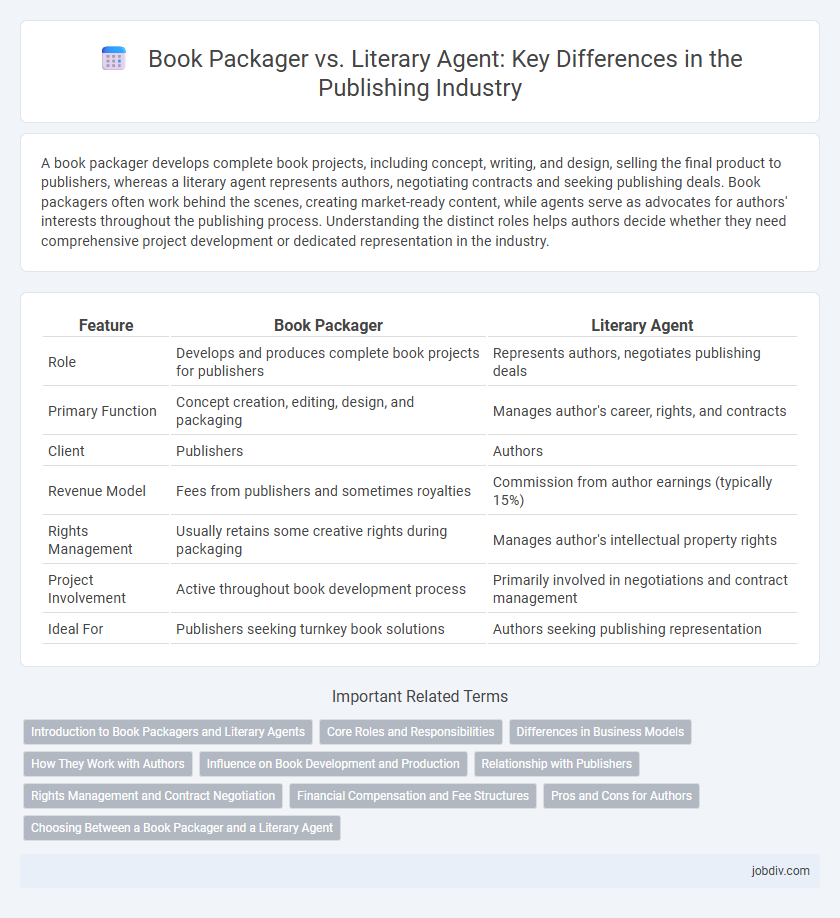A book packager develops complete book projects, including concept, writing, and design, selling the final product to publishers, whereas a literary agent represents authors, negotiating contracts and seeking publishing deals. Book packagers often work behind the scenes, creating market-ready content, while agents serve as advocates for authors' interests throughout the publishing process. Understanding the distinct roles helps authors decide whether they need comprehensive project development or dedicated representation in the industry.
Table of Comparison
| Feature | Book Packager | Literary Agent |
|---|---|---|
| Role | Develops and produces complete book projects for publishers | Represents authors, negotiates publishing deals |
| Primary Function | Concept creation, editing, design, and packaging | Manages author's career, rights, and contracts |
| Client | Publishers | Authors |
| Revenue Model | Fees from publishers and sometimes royalties | Commission from author earnings (typically 15%) |
| Rights Management | Usually retains some creative rights during packaging | Manages author's intellectual property rights |
| Project Involvement | Active throughout book development process | Primarily involved in negotiations and contract management |
| Ideal For | Publishers seeking turnkey book solutions | Authors seeking publishing representation |
Introduction to Book Packagers and Literary Agents
Book packagers create complete book projects by coordinating writers, editors, and illustrators to deliver ready-to-publish manuscripts to publishers, streamlining the production process. Literary agents represent authors, negotiating contracts and securing publishing deals while advocating for their clients' rights and career advancement. Understanding the distinct roles clarifies the publishing ecosystem, highlighting how book packagers focus on content creation and agents on author representation.
Core Roles and Responsibilities
A book packager develops complete book concepts, manages editorial content, design, and production to deliver ready-to-publish manuscripts to publishers, often handling multiple projects simultaneously. A literary agent primarily represents authors, negotiating publishing contracts, securing book deals, and guiding career development to maximize authors' market potential. While book packagers control the creative and production process, literary agents focus on sales, rights management, and fostering author-publisher relationships.
Differences in Business Models
Book packagers develop complete book concepts, handling writing, design, and production before selling finished manuscripts or prototypes to publishers, operating on a project-based, service-oriented business model. Literary agents represent authors, focusing on rights negotiation and contract management to secure publishing deals, earning commissions based on sales and advances. The book packager profits primarily from upfront project fees or licensing, while agents earn through a percentage of the author's income generated by the book.
How They Work with Authors
Book packagers collaborate directly with authors to develop concepts, manage the entire production process, and often hold the publishing rights, enabling a hands-on approach in shaping the book from inception to final product. Literary agents represent authors by negotiating contracts, securing publishing deals, and advocating for their clients' rights and interests within the publishing industry, primarily acting as intermediaries between authors and publishers. While packagers are involved in creating and assembling book content, agents focus on career management and contract negotiation to maximize authors' reach and earnings.
Influence on Book Development and Production
Book packagers play a crucial role in shaping the concept, design, and production timeline of a book by coordinating writers, illustrators, and editors to create a ready-to-publish product. Literary agents primarily influence book development by advocating for the author's vision, negotiating contracts, and securing publishing deals that align with market trends and author goals. While book packagers directly manage the creative and production processes, literary agents focus more on the business and rights aspects, both significantly impacting the final book outcome.
Relationship with Publishers
Book packagers collaborate closely with publishers by developing complete book concepts and delivering ready-to-print manuscripts, facilitating a streamlined production process. Literary agents serve as intermediaries, negotiating contracts and securing the best publishing deals for authors while maintaining ongoing communication with editors and publishers. Publishers rely on book packagers for efficient content creation and on literary agents for acquiring high-quality manuscripts through trusted author representation.
Rights Management and Contract Negotiation
Book packagers often retain significant control over rights management, bundling creative elements and negotiating contracts to streamline production and distribution processes for publishers. Literary agents specialize in contract negotiation on behalf of authors, securing favorable terms and ensuring rights such as foreign translations, film adaptations, and digital formats remain author-friendly. Understanding the distinctions in rights control and negotiation strategies is crucial for authors aiming to maximize revenue streams and maintain creative ownership.
Financial Compensation and Fee Structures
Book packagers typically receive a flat fee or a percentage of the book's production budget, managing the entire creation process and sometimes sharing royalties with authors. Literary agents operate on a commission basis, generally earning 15% of the author's earnings from book deals, including advances and royalties. This divergent fee structure impacts financial compensation, with packagers offering upfront payment security and agents aligning their income with the book's market success.
Pros and Cons for Authors
Book packagers streamline the publishing process by managing all aspects from manuscript development to design, offering authors a more hands-on role and often quicker publication timelines, but may limit creative control and reduce royalty shares. Literary agents provide expert representation, negotiate better contracts, and open doors to traditional publishers, enhancing authors' market reach and potential earnings, though their services often entail longer submission periods and commission-based fees. Authors must weigh the trade-off between creative autonomy and industry connections when choosing between book packagers and literary agents.
Choosing Between a Book Packager and a Literary Agent
Choosing between a book packager and a literary agent depends on the level of creative control and industry connections an author seeks; book packagers often handle concept development, editing, and production, streamlining the publishing process. Literary agents focus on securing publishing deals, negotiating contracts, and protecting author rights, offering personalized career guidance and access to established publishing networks. Evaluating an author's goals--whether prioritizing comprehensive project management or targeted contract negotiation--helps determine the best representation choice.
Book Packager vs Literary Agent Infographic

 jobdiv.com
jobdiv.com